Rumiko Takahashi
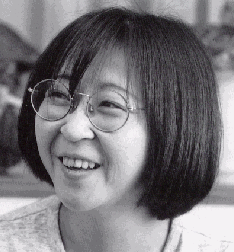
Biography:
The spotlight on Rumiko Takahashi's career began in 1978 when she won an honorable mention in Shogakukan's annual New Comic Artist Contest for Those Selfish Aliens (Urusei Yatsura). Later that same year, her boy-meets-alien comedy series, Urusei Yatsura, was serialized in Weekly Shonen Sunday. This phenomenally successful manga series was adapted into anime format and spawned a TV series and half a dozen theatrical-release movies, all incredibly popular in their own right. Takahashi followed up the success of her debut series with one blockbuster hit after another—Maison Ikkoku ran from 1980 to 1987, Ranma 1/2 from 1987 to 1996, and Inuyasha from 1996 to 2008. Other notable works include Mermaid Saga, Rumic Theater, and One-Pound Gospel. Takahashi won the prestigious Shogakukan Manga Award twice in her career, once for Urusei Yatsura in 1981 and the second time for Inuyasha in 2002. A majority of the Takahashi canon has been adapted into other media such as anime, live-action TV series, and film. 1
Takahashi's manga, as well as the other formats her work has been adapted into, have continued to delight generations of fans around the world. Distinguished by her wonderfully endearing characters, Takahashi's work adeptly incorporates a wide variety of elements such as comedy, romance, fantasy, and martial arts. While her series are difficult to pin down into one simple genre, the signature style she has created has come to be known as the "Rumic World." Rumiko Takahashi is an artist who truly represents the very best from the world of manga. 1
Themes:
Rumiko Takahashi's work as a manga artist is legendary. Arguably her most famous works are Urusei Yatsura, Ranma 1/2, and Maison Ikkoku. These works are the trademark of the style she is best known for, the romantic comedy. The main features of her romantic comedies are a hapless protagonist that somehow has a large amount of female interests and/or the inability to commit to a relationship. Often these protagonists such as Godai from Maison Ikkoku have a complex set of personal problems that make it difficult to express his feelings for the manager. The place of comedy in these manga is to break the romantic tension at just the right time. Usually this is the place of the other characters, often times other characters who have a love interest in the main protagonists. In these works Takahashi also seems to enjoy portraying adolescents in very grown up situations of marriage. The three main protagonists in the aforementioned manga are all in their late teens and attempting to move on to adulthood which is a time of high stress in the average person's life. As a result, the characters are somehow relatable though in very unimaginable circumstances, so often Takahashi's romantic comedies serve as a parody of real life.Works:
| Series Title (Click for series info) | Genre | Year | ||
| 1 or W | Gender Bender, Seinen | 1995 | ||
| 1 Pound no Fukuin | Comedy, Romance, Seinen, Sports | 1989 | ||
| Akai Hanataba | Slice of Life | 2005 | ||
| Dust Spot!! | Comedy, Romance, Supernatural | 1979 | ||
| Giri no Vacance | Comedy, Seinen, Slice of Life | 2004 | ||
| InuYasha | Action, Adventure, Comedy, Fantasy, Historical, Romance, Shounen | 1996 | ||
| Kyoukai no Rinne | Comedy, School Life, Shounen, Supernatural | 2009 | ||
| Maison Ikkoku | Comedy, Drama, Romance, School Life, Seinen, Slice of Life | 1980 | ||
| Mermaid Saga | Drama, Horror, Romance, Shounen, Supernatural | 1984 | ||
| My Sweet Sunday | Shounen, Slice of Life | 2009 | ||
| P no Higeki | Comedy, Seinen | 1994 | ||
| Ranma 1/2 | Action, Comedy, Ecchi, Gender Bender, Harem, Martial Arts, Romance, School Life, Shounen | 1988 | ||
| Rumic World | Adventure, Comedy, Drama, Fantasy, Romance, Sci-fi, Slice of Life, Supernatural, Tragedy | -- | ||
| Senmu no Inu | Comedy, Drama, Seinen, Slice of Life | 1999 | ||
| Takahashi Rumiko Gekijou | Comedy, Horror, Seinen, Slice of Life | 2003 | ||
| Unmei no Tori | Seinen, Slice of Life, Supernatural | 2009 | ||
| Urusei Yatsura | Comedy, Fantasy, Romance, School Life, Sci-fi, Shounen | 1978 |
Works Cited:
1. http://www.therumicworld.com/takahashi.php 2. http://www.mangaupdates.com/authors.html?id=636#Hayao Miyazaki

Biography:
Hayao Miyazaki was born in Tokyo on January 5, 1941. He started his career in 1963 as an animator at the studio Toei Douga, and was subsequently involved in many early classics of Japanese animation. From the beginning, he commanded attention with his incredible ability to draw, and the seemingly-endless stream of movie ideas he proposed. In 1971, he moved to A Pro with Isao Takahata, then to Nippon Animation in 1973, where he was heavily involved in the World Masterpiece Theater TV animation series for the next five years. In 1978, he directed his first TV series, Conan, The Boy in Future, Lupin III: The Castle of Cagliostro. then moved to Tokyo Movie Shinsha in 1979 to direct his first movie, the classic Lupin III: The Castle of Cagliostro . In 1984, he released Nausicaä of the Valley of Wind, based on the manga (comic) of the same title he had started two years before. The success of the film led to the establishment of a new animation studio, Studio Ghibli, at which Miyazaki has since directed, written, and produced many other films with Takahata. All of these films enjoyed critical and box office successes. In particular, Miyazaki's Princess Mononoke received the Japan Academy Award for Best Film and was the highest-grossing (about US$150 million) domestic film in Japan's history until it was taken over by another Miyazaki work, Spirited Away. In addition to animation, Miyazaki also draws manga. His major work was the Nausicaä manga, an epic tale he worked on intermittently from 1982 to 1994 while he was busy making animated films. Another manga, Hikoutei Jidai, was later evolved into his 1992 film Porco Rosso. 2 Recently Studio Ghibli opened a Museum in Mitaka, Japan More info hereThemes:
One of the themes of Miyazaki's masterpiece work, Nausicaa, is repeated in some of his later movies such as Princess Mononoke, that is the theme of a young girl being caught in the middle of a war. This relates to some of the themes of war touched on in the works of other mangaka in the 1970's where World War II was very hotly criticised. It seems that Miyazaki is no exception to those anti-war sentiments and this is why often the main characters try to stop the war around them in various ways. Perhaps his most efficient tactic is showing the real life of the small and helpeless caught up in the midst of war. Sometimes the girl is reluctant to be a part of the war efforts, and sometimes they are more patriotic. Nausicaa falls in to the latter category. While Nausicaa is a pilot and fiercely devoted to her country, she also sees the evils of humanity reflected through her strong connection to nature. She becomes a fighter on two fronts- One for country, one for nature. The conflict between the man/nature duality seems to beg the question to the viewer: Which side is more worthy? We see this conflict arise in Nausicaa when she calms the attacking horde of Ohmu. Similarly, in Princess Mononoke, Ashitaka and San try to stop the deer god from destroying the forest by returning its head to calm its fury. The conflict is never completely solved by the main character, but usually there is a glimmer of hope for the future. This seems to be the most important feature of these films, that there is hope for life to return to normal, just as Japan survived World War II.Works:
- Gake no ue no Ponyo (2008)
... aka "Ponyo" - UK, USA
... aka "Ponyo on the Cliff by the Sea" - Australia, International (English title)
... aka "Ponyo on the Cliff" - International (English title) (informal literal title) - Hoshi wo katta hi (2006)
- Mizugumo monmon (2006)
- Yadosagashi (2006)
- Hauru no ugoku shiro (2004)
... aka "Howl's Moving Castle" - International (English title), UK, USA - Mei to Koneko basu (2002)
... aka "Mei and the Kitten Bus" - International (English title) - Koro no dai-sanpo (2002)
- Kujira tori (2001)
- Sen to Chihiro no kamikakushi (2001)
... aka "Miyazaki's Spirited Away" - International (English title), USA (poster title)
... aka "Spirited Away" - UK, USA - Mononoke-hime (1997)
... aka "Princess Mononoke" - UK, USA - On Your Mark (1995)
- Kurenai no buta (1992)
... aka "Porco Rosso" - Australia, Europe (English title), International (English title), UK, USA
... aka "The Crimson Pig" - International (English title) (literal title) - Majo no takkyûbin (1989)
... aka "Kiki's Delivery Service" - UK, USA
... aka "Witch's Special Express Delivery" - International (English title) (literal title) - Tonari no Totoro (1988)
... aka "My Neighbor Totoro" - USA - Tenkû no shiro Rapyuta (1986)
... aka "Castle in the Sky" - UK, USA
... aka "Castle in the Sky Laputa" - International (English title) (literal title)
... aka "Laputa" - USA (short title) - "Meitantei Holmes" (6 episodes, 1984-1985)
- The Targeted Giant Coin Bank (1985) TV episode
- The Air Battle Over Dover! (1985) TV episode
- Treasure Under the Sea (1985) TV episode
- Blue Ruby (1984) TV episode
- The Kidnapping Case of Mrs. Hudson (1984) TV episode
( 1 more) - Kaze no tani no Naushika (1984)
... aka "Nausicaä of the Valley of the Wind" - UK, USA (new title)
... aka "Warriors of the Wind" - USA - "Rupan sansei: Part II" (2 episodes, 1980)
... aka "Lupin the 3rd" - USA
- Farewell My Beloved Lupin (1980) TV episode (as Tsutomu Teruki)
- Wings of Death: Albatross (1980) TV episode (as Tsutomu Teruki) - Rupan sansei: Kariosutoro no shiro (1979)
... aka "Lupin the Third: The Castle of Cagliostro" - International (English title) - "Mirai shônen Konan" (26 episodes, 1978)
- Denouement (1978) TV episode
- Remnant Island (1978) TV episode
- A Big Tidal Wave (1978) TV episode
- A Day on the Island (1978) TV episode
- Barren Land (1978) TV episode
( 21 more) - "Rupan sansei" (15 episodes, 1971-1972)
- The Great Gold Showdown! (1972) TV episode
- The First Move Wins Computer Operation! (1972) TV episode
- Rescue the Tomboy! (1972) TV episode
- Catch the Phony Lupin! (1972) TV episode
- Which of the Third Generation Will Win! (1972) TV episode
( 10 more)
Works Cited:
1. http://www.imdb.com/name/nm0594503/ 2. http://www.nausicaa.net/miyazaki/miyazaki/Katsuhiro Otomo

Biography:
Katsuhiro Otomo was born April 14, 1954. Otomo is most famous for his work on both the animated feature film and 2000 page manga series Akira. Akira started in a bi-monthly magazine called "YOUNG MAGAZINE" and was published from 1982 to 1990. Otomo was one of the more famous postwar manga artists of Japan. While the Western world credits Otomo mostly with Akira, his first hit in Japan was called Domu: A Child's Dream. Domu was very similar to Akira in that both revolved around "children" with telekinetic powers. In Akira we have the Espers, a group of three "children" with telekinetic powers and while they look like children they are much older because of testing done on them to keep their powers under wraps. There is also Tetsuo Shima, a teenager who mysteriously gained telekinetic powers after crashing his motorcycle into one of the espers. The Espers limit the use of their powers and are always kept under close watch, they do not use their powers unless provoked or an outburst of anger forces them to. Tetsuo recklessly uses his powers to try and prove himself to his childhood friend Kaneda. Inversely, in Domu there is a senile old man named Chojiro Uchida. He too has psychic powers but unlike the Espers from Akira, Uchida has the mental capacity of a small child and cannot distinguish right from wrong. He murders without regard thinking that it is all a child's game and that he is not doing anything wrong. Otomo is also well known for his unique art style. Where most anime artists tend to make their characters somewhat unrealistic looking, Otomo's style is more simplistic and realistic to the human form.
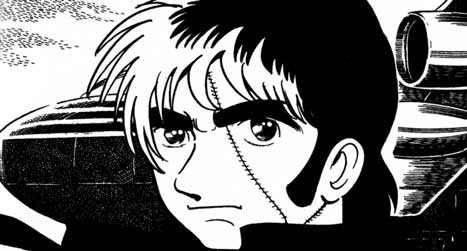 On the left is Otomo's character Tetsuo from Akira and on the right is Osamu Tezuka's Black Jack. As we can see Otomo's style is significantly more realistic when it comes to the nose, eyes, ears, and even shading of the human face. Tetsuo's eyes aren't just the large black dots, but rather you can make out his pupils and his iris.This particular picture is also Tetsuo's eyes at their largest and most open, even then they are smaller than Black Jack's typical gigantic anime eyes. Also, Tetsuo's eyebrows aren't just two colored in black bars, you can see the small hairs that make up his eyebrows. Another feature is the nose, it is not the hooked slant that most anime characters have. It is a defined nose with nostrils. Also, while Otomo doesn't do it for every panel, you can see that Tetsuo has teeth, it isn't just two white bars inside his mouth. There are individual teeth inside his mouth.
Otomo also provided the script for the popular animated version of Osamu Tezuka's Metropolis. Also, like Tezuka, Akira is done in a very cinematic style, "Otomo's style is extremely cinematic. Complete with fade-ins, voice-overs, speed lines, slow motion, and even those smudgy lines lights make on video at night."
At the moment Otomo's manga career seems to be at a standstill. Much like Miyazaki he has been quoted as saying he much prefers working with live action and animated films rather than drawing manga, despite drawing one of the most influential manga titles in Akira.
On the left is Otomo's character Tetsuo from Akira and on the right is Osamu Tezuka's Black Jack. As we can see Otomo's style is significantly more realistic when it comes to the nose, eyes, ears, and even shading of the human face. Tetsuo's eyes aren't just the large black dots, but rather you can make out his pupils and his iris.This particular picture is also Tetsuo's eyes at their largest and most open, even then they are smaller than Black Jack's typical gigantic anime eyes. Also, Tetsuo's eyebrows aren't just two colored in black bars, you can see the small hairs that make up his eyebrows. Another feature is the nose, it is not the hooked slant that most anime characters have. It is a defined nose with nostrils. Also, while Otomo doesn't do it for every panel, you can see that Tetsuo has teeth, it isn't just two white bars inside his mouth. There are individual teeth inside his mouth.
Otomo also provided the script for the popular animated version of Osamu Tezuka's Metropolis. Also, like Tezuka, Akira is done in a very cinematic style, "Otomo's style is extremely cinematic. Complete with fade-ins, voice-overs, speed lines, slow motion, and even those smudgy lines lights make on video at night."
At the moment Otomo's manga career seems to be at a standstill. Much like Miyazaki he has been quoted as saying he much prefers working with live action and animated films rather than drawing manga, despite drawing one of the most influential manga titles in Akira.
Manga:
A Gun Report (1973), Short Peace (1979), Highway Star (1979), Fireball (1979), Domu: A Child's Dream (1980), Kibun wa mo Senso (1980), Sayonara Nippon (1981), Akira (1982), Visitors (1984), Kanojo no Omoide... (1990), The Legend of Mother Sarah (Writer, 1990), ZeD (Writer, 1990), SOS! Tokyo Metro Explorers (1996), Batman: Black & White #4: The Third Mask (1996), Hipira: The Little Vampire (Writer, 2001), Park (2006), Kaba (Artbook, 1987), Akira Portfolio (Artbook, 2002), Akira Club (Artbook, 2007)Anime:
Neo Tokyo (1987), Robot Carnival (1987), Akira (1988), Memories (1995), Steamboy (2004)Works Cited:
Katsuhiro OTOMO. Anime News Network, n.d. Web. 22 Mar 2010. <http://www.animenewsnetwork.com/encyclopedia/people.php?id=232>. Brownlow, Nick. "Akira2019." Biography of Katsuhiro Otomo. n.d. Web. 22 Mar 2010. <http://www.akira2019.com/katsuhiro-otomo.htm>. Bergin, J. "Akira Manga Review." Akira2019. n.d. Web. 24 Mar 2010. <http://www.akira2019.com/manga.htm>.Riyoko Ikeda
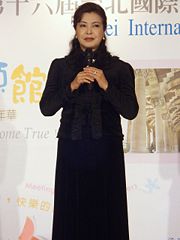
Biography:
Riyoko Ikeda was born December 18, 1947. She is best known for the manga The Rose of Versailles (Versailles no Bara) which has been claimed as one of the most influential girl's manga. It was initially a biographical story based upon the life of Marie Antoinette. She is also a member of the Year 24 Group, a group of female manga artists that revolutionized Shojo Manga. Riyoko's inspiration to draw manga came from reading the manga of Osamu Tezuka. Much of her earlier work also heavily resembled the art style of Osamu Tezuka. Her first manga, "Bara Yashiki no Shojo", is a direct reference to Osamu Tezuka's "Bara Yashiki no Nazo". At one point Ikeda had retired from drawing manga to make an attempt at a music career. She returned to drawing manga, specifically drawing scenery, in 1999. In regards to Ikeda's style being similar to Osamu Tezuka's, the man who inspired her to become a manga artist, I would like to present an example of each of their work to show the similarities.
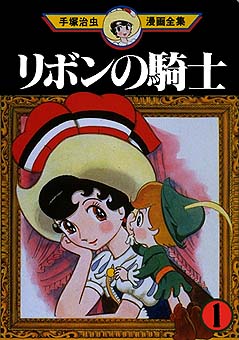 On the left is Riyoko Takeda's work and on the right is Osamu Tezuka's work. We can see the similarities in a number of places. The neck on both characters seem to be somewhat long, perhaps because it makes the character look younger or more innocent. Also, the eyelashes and eyes are done in almost the exact same style. Their eyes have light heavily reflecting off of them to make the character look more glamorous. Their eyelashes are noticeably feminine, however, the eyelashes aren't that way across the entire eye, only at the ends of them. The nose also appears to be the same hooked slant, however, in anime and manga that could be a similarity for any number of artists considering how common it is. There are also differences between the two styles. For example, the eyelashes on Ikeda's character seem to be much more drawn out at the ends than Tezuka's character. Ikeda's character's eyes are also much more glossy when it comes to the amount of light sparkling off her eyes, it almost seems like her eyes are covered in glitter. Ikeda's mouth also shows signs of feminine lips where Tezuka's is only a single line for the mouth.
According to the Mechademia article "Revolutionary Romance:The Rose of Versailles and the Transformation of Shojo Manga", the Rose of Versailles started what was to be known as the "Beru-boom". A movement in Japan that started in the 1970s where the female Japanese teenagers were infatuated with anything from France or having to do with the French. The series had such a "devoted" fan basis that when one of the main characters died a fan mailed a letter with a razor blade to Riyoko Ikeda. Ikeda is also praised for the fact that she shows a heterosexual romance among equals when typically it was suggested that the preference was to have romance with a stronger woman.
Much like with Miyazaki and Nausicaa of the Valley of the Wind, Riyoko Ikeda's famous "The Rose of Versailles" had more of a non-Japanese flare to it. The Rose of Versailles is placed in France both before and during the French Revolution, so its non-Japanese themes aren't a complete shock. Riyoko Ikeda was presented with France's highest honor, Ordre national de la Legion d'honneur (National Order of the Legion of Honor) at the French Ambassador's home in Tokyo. The Ambassador of France had said that thanks to Ikeda the people of Japan now had a significant awareness of French culture, history, cuisine, and language.
As previously stated, Ikeda was part of the Year 24 group. The members of this group included Yasuko Aoike, Moto Hagio, Yumiko Oshima, Keiko Takemiya, Toshie Kihara, Ryoko Yamagishi, Minori Kimura, Nanae Sasaya, Mineko Yamada and of course Riyoko Ikeda. This was the first major group of women in the manga world and they would change the way Shojo manga would be drawn forever. For starters, it was the first time that Shojo Manga was being drawn by women for women. Until this time it was mostly male artists drawing it, such as Princess Knight by Osamu Tezuka. They also changed the way the borders were used in manga by using them to help covey emotions. They would either soften, harden, or completely remove the borders depending on what emotion they wanted to be prominent. It has been said that the Year 24 Group's success made it possible for manga artists such as Rumiko Takahashi to gain such popularity in the manga world.
On the left is Riyoko Takeda's work and on the right is Osamu Tezuka's work. We can see the similarities in a number of places. The neck on both characters seem to be somewhat long, perhaps because it makes the character look younger or more innocent. Also, the eyelashes and eyes are done in almost the exact same style. Their eyes have light heavily reflecting off of them to make the character look more glamorous. Their eyelashes are noticeably feminine, however, the eyelashes aren't that way across the entire eye, only at the ends of them. The nose also appears to be the same hooked slant, however, in anime and manga that could be a similarity for any number of artists considering how common it is. There are also differences between the two styles. For example, the eyelashes on Ikeda's character seem to be much more drawn out at the ends than Tezuka's character. Ikeda's character's eyes are also much more glossy when it comes to the amount of light sparkling off her eyes, it almost seems like her eyes are covered in glitter. Ikeda's mouth also shows signs of feminine lips where Tezuka's is only a single line for the mouth.
According to the Mechademia article "Revolutionary Romance:The Rose of Versailles and the Transformation of Shojo Manga", the Rose of Versailles started what was to be known as the "Beru-boom". A movement in Japan that started in the 1970s where the female Japanese teenagers were infatuated with anything from France or having to do with the French. The series had such a "devoted" fan basis that when one of the main characters died a fan mailed a letter with a razor blade to Riyoko Ikeda. Ikeda is also praised for the fact that she shows a heterosexual romance among equals when typically it was suggested that the preference was to have romance with a stronger woman.
Much like with Miyazaki and Nausicaa of the Valley of the Wind, Riyoko Ikeda's famous "The Rose of Versailles" had more of a non-Japanese flare to it. The Rose of Versailles is placed in France both before and during the French Revolution, so its non-Japanese themes aren't a complete shock. Riyoko Ikeda was presented with France's highest honor, Ordre national de la Legion d'honneur (National Order of the Legion of Honor) at the French Ambassador's home in Tokyo. The Ambassador of France had said that thanks to Ikeda the people of Japan now had a significant awareness of French culture, history, cuisine, and language.
As previously stated, Ikeda was part of the Year 24 group. The members of this group included Yasuko Aoike, Moto Hagio, Yumiko Oshima, Keiko Takemiya, Toshie Kihara, Ryoko Yamagishi, Minori Kimura, Nanae Sasaya, Mineko Yamada and of course Riyoko Ikeda. This was the first major group of women in the manga world and they would change the way Shojo manga would be drawn forever. For starters, it was the first time that Shojo Manga was being drawn by women for women. Until this time it was mostly male artists drawing it, such as Princess Knight by Osamu Tezuka. They also changed the way the borders were used in manga by using them to help covey emotions. They would either soften, harden, or completely remove the borders depending on what emotion they wanted to be prominent. It has been said that the Year 24 Group's success made it possible for manga artists such as Rumiko Takahashi to gain such popularity in the manga world.
Manga:
Bara Yashiki no Shojo, Soyo Kaze no Mary, The Rose of Versailles, Shoko no Etude, Claudine, Oniisama e, Orpheus no Mado, Jotei Ecatherina, Eikou no Napoleon – Eroica, Der Ring des Nibelungen, Spring Snow, Ten no Hate Made - Poland Hishi, Ayako, Epitaram: A Wedding SongAnime:
Works Cited:
Shamoon, Deborah. "Revolutionary Romance: The Rose of Versailles and the Transformation of Shojo Manga." Mechademia. 2. (2007): 3-15. Print. Rose of Versailles Ikeda Receives France Top Honor . Anime News Network, 03/12/2009. Web. 22 Mar 2010. <http://www.animenewsnetwork.com/news/2009-03-12/rose-of-versailles-ikeda-receives-france-top-honor>Osamu Tezuka

Biography
Osamu Tezuka was born November 3, 1928, in Toyonaka City, Osaka. He was raised in a progressive, upper-middle class family where both parents incouraged artistic creativity. As a day job, he worked as a physician. At only seventeen Tezuka published his first comic, Ma-chan no Nikki. The rising popularity in Manga eventually allowed him to start his own animation studio.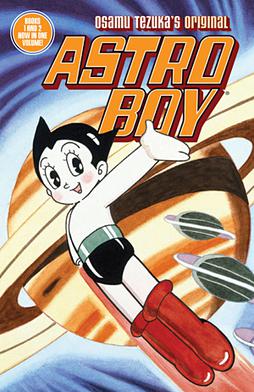
Awards
| TITLE | ** | Year | ||
| Shogakukan Manga Award for Manga Seminar on Biology and Biiko-chan | 1958 | |||
| Bungeishunjū manga Award | 1975 | |||
| Japan Mangaka Association Award — Special Award | 1975 | |||
| Kodansha Manga Award for Black Jack and The Three-Eyed One | 1977 | |||
| Shogakukan Manga Award for Hidamari no Ki | 1983 | |||
| Hiroshima International Animation Festival for Onboro-Film | 1985 | |||
| Kodansha Manga Award for Adolf | 1986 | |||
| Nihon SF Taisho Award - Special Award | 1989 | |||
| Zuih�sho 3rd class | 1989 | |||
| Eisner Award for Buddha (vols. 1–2) | 2004 | |||
| Eisner Award for Buddha (vols. 3-4) | 2005 | |||
Ideas, requests, problems regarding CSUSB Community Wiki? Send feedback

